During professional interactions, effective communication is key to maintaining productive relationships.
However, there are instances when we may find ourselves grappling with the challenge of expressing our need to guard our time without compromising professionalism.
In this blog post, we will explore how to professionally say don’t waste my time and different strategies to gracefully communicate the message of “don’t waste my time” in a nice and respectful manner.
We will delve into alternative phrases that convey the same sentiment with respect, discuss how to express gratitude even in frustrating situations, explore polite ways to address time-wasting behavior, and reflect on whether the phrase itself is perceived as rude.
By mastering these techniques, we can foster harmonious and efficient exchanges while preserving professional decorum.
Table of Contents
How to professionally say don’t waste my time?
When communicating in a professional setting, it is important to convey your message clearly and respectfully, even when expressing the sentiment of not wanting to have your time wasted.
Instead of using a direct and potentially confrontational phrase like “Don’t waste my time,” there are alternative approaches that can maintain professionalism while still conveying your point effectively.
One strategy is to set clear expectations and boundaries from the beginning.
When scheduling meetings or appointments, provide a specific agenda or outline of what needs to be discussed or accomplished.
This ensures that everyone involved understands the purpose and value of the time being allocated.
If you find that a conversation or interaction is straying off-topic or becoming unproductive, it’s essential to redirect the conversation politely.
You can achieve this by subtly reminding the other party of the main goal or objective, and gently steer the conversation back on track.
Another approach is to express your need for efficiency and time management.
Emphasize the importance of optimizing productivity and reaching goals within specific timeframes.
By highlighting the mutual benefits of efficient use of time, you can encourage others to respect your time and stay focused on the task at hand.
It’s also crucial to maintain a respectful and understanding tone throughout the conversation.
Instead of using negative phrases, try framing your request positively.
For instance, you could say, “I appreciate your input, and I think we can make this discussion more productive by focusing on the key points.
” This approach acknowledges the other person’s contribution while gently redirecting the conversation.
Active listening plays a significant role in professional communication.
If someone tends to digress or go off-topic, you can use active listening techniques to demonstrate your attention and engagement.
Reflect on what they said briefly, summarize their point, and then politely bring the discussion back to the main topic.
Also read: How to politely tell someone to shut up? (135 Examples with professional tips)
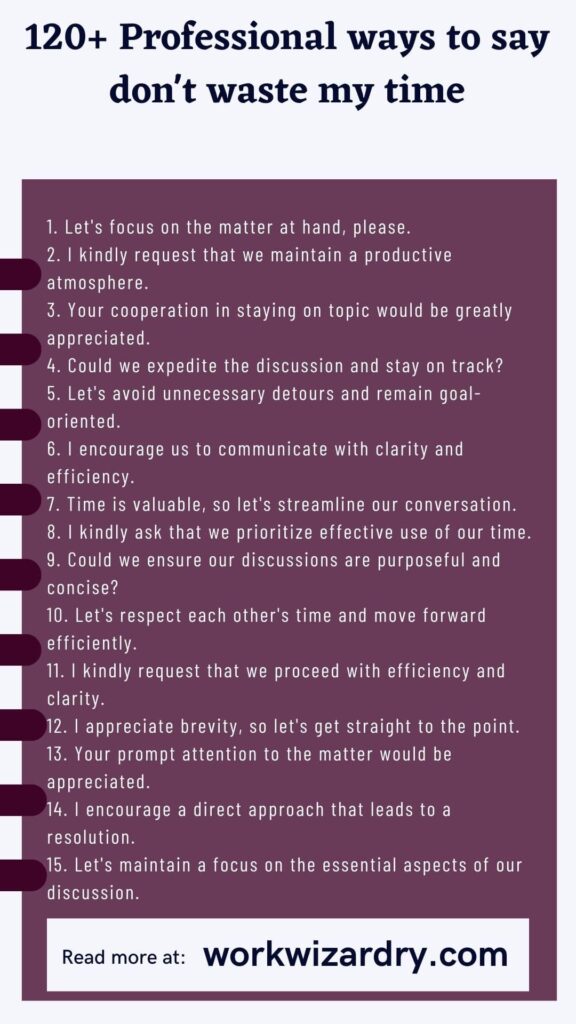
120+ Polite ways to say Don’t waste my time
The following is a list of polite ways to say don’t waste my time:
1. Let’s focus on the matter at hand, please.
2. I kindly request that we maintain a productive atmosphere.
3. Your cooperation in staying on topic would be greatly appreciated.
4. Could we expedite the discussion and stay on track?
5. Let’s avoid unnecessary detours and remain goal-oriented.
6. I encourage us to communicate with clarity and efficiency.
7. Time is valuable, so let’s streamline our conversation.
8. I kindly ask that we prioritize effective use of our time.
9. Could we ensure our discussions are purposeful and concise?
10. Let’s respect each other’s time and move forward efficiently.
11. I kindly request that we proceed with efficiency and clarity.
12. I appreciate brevity, so let’s get straight to the point.
13. Your prompt attention to the matter would be appreciated.
14. I encourage a direct approach that leads to a resolution.
15. Let’s maintain a focus on the essential aspects of our discussion.
Also read: How to tell someone off in a professional way? (125 Example phrases for different situations)
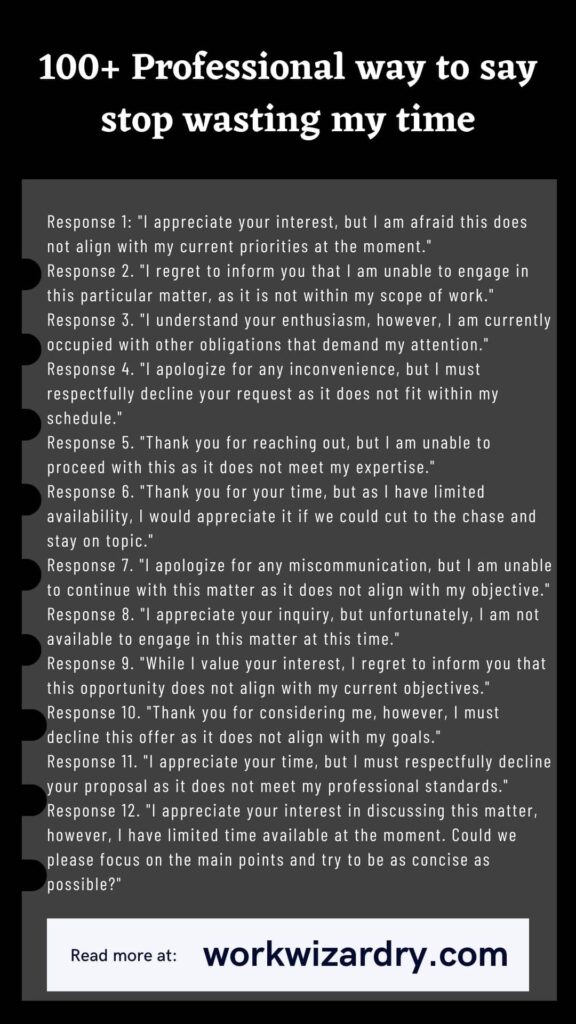
Professional way to say stop wasting my time
Here is a list of professional way to say stop wasting my time:
Response 1: “I appreciate your interest, but I am afraid this does not align with my current priorities at the moment.”
Response 2. “I regret to inform you that I am unable to engage in this particular matter, as it is not within my scope of work.”
Response 3. “I understand your enthusiasm, however, I am currently occupied with other obligations that demand my attention.”
Response 4. “I apologize for any inconvenience, but I must respectfully decline your request as it does not fit within my schedule.”
Response 5. “Thank you for reaching out, but I am unable to proceed with this as it does not meet my expertise.”
Response 6. “Thank you for your time, but as I have limited availability, I would appreciate it if we could cut to the chase and stay on topic.”
Response 7. “I apologize for any miscommunication, but I am unable to continue with this matter as it does not align with my objective.”
Response 8. “I appreciate your inquiry, but unfortunately, I am not available to engage in this matter at this time.”
Response 9. “While I value your interest, I regret to inform you that this opportunity does not align with my current objectives.”
Response 10. “Thank you for considering me, however, I must decline this offer as it does not align with my goals.”
Response 11. “I appreciate your time, but I must respectfully decline your proposal as it does not meet my professional standards.”
Response 12. “I appreciate your interest in discussing this matter, however, I have limited time available at the moment. Could we please focus on the main points and try to be as concise as possible?”
Response 13. “I am happy to hear your perspective, but with my tight schedule, I would appreciate it if we could keep the conversation brief and focused on the most critical issues.”
Also read: How to professionally say go to hell? (75+ Examples and tips)
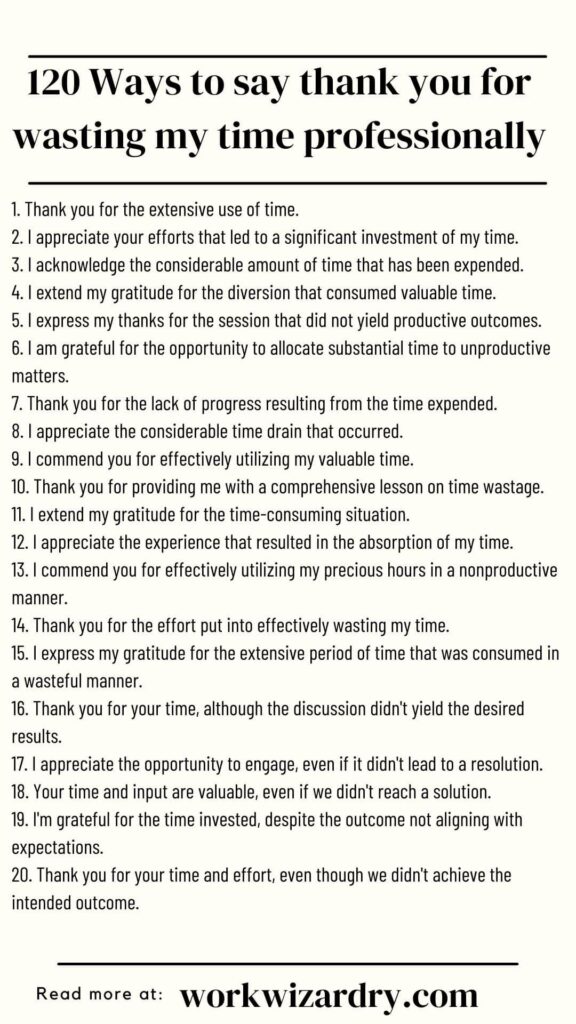
How to say thank you for wasting my time professionally?
These are a few examples on how to say thank you for wasting my time professionally:
1. Thank you for the extensive use of time.
2. I appreciate your efforts that led to a significant investment of my time.
3. I acknowledge the considerable amount of time that has been expended.
4. I extend my gratitude for the diversion that consumed valuable time.
5. I express my thanks for the session that did not yield productive outcomes.
6. I am grateful for the opportunity to allocate substantial time to unproductive matters.
7. Thank you for the lack of progress resulting from the time expended.
8. I appreciate the considerable time drain that occurred.
9. I commend you for effectively utilizing my valuable time.
10. Thank you for providing me with a comprehensive lesson on time wastage.
11. I extend my gratitude for the time-consuming situation.
12. I appreciate the experience that resulted in the absorption of my time.
13. I commend you for effectively utilizing my precious hours in a nonproductive manner.
14. Thank you for the effort put into effectively wasting my time.
15. I express my gratitude for the extensive period of time that was consumed in a wasteful manner.
16. Thank you for your time, although the discussion didn’t yield the desired results.
17. I appreciate the opportunity to engage, even if it didn’t lead to a resolution.
18. Your time and input are valuable, even if we didn’t reach a solution.
19. I’m grateful for the time invested, despite the outcome not aligning with expectations.
20. Thank you for your time and effort, even though we didn’t achieve the intended outcome.
21. I want to express my appreciation for the time you dedicated, even if it didn’t produce the desired outcome.
22. Despite the lack of progress, I’m thankful for the time you devoted to this matter.
23. Thank you for investing your time, even if it didn’t result in the expected outcome.
24. I’m grateful for the opportunity to collaborate, even if the time spent didn’t lead to a resolution.
25. Despite the outcome, I appreciate the time you dedicated to this discussion.
26. Thank you for your time and input, although it didn’t contribute to the intended outcome.
27. I want to express my gratitude for the time you spent, even if it didn’t yield the desired results.
28. Despite the lack of progress, I value the time you invested in this endeavor.
29. I appreciate the opportunity to engage with you, even if the time spent didn’t lead to a conclusive outcome.
30. Thank you for your involvement, even though the time spent didn’t result in a resolution.
Also read: 400 Other ways to say no problem (professional and informal)
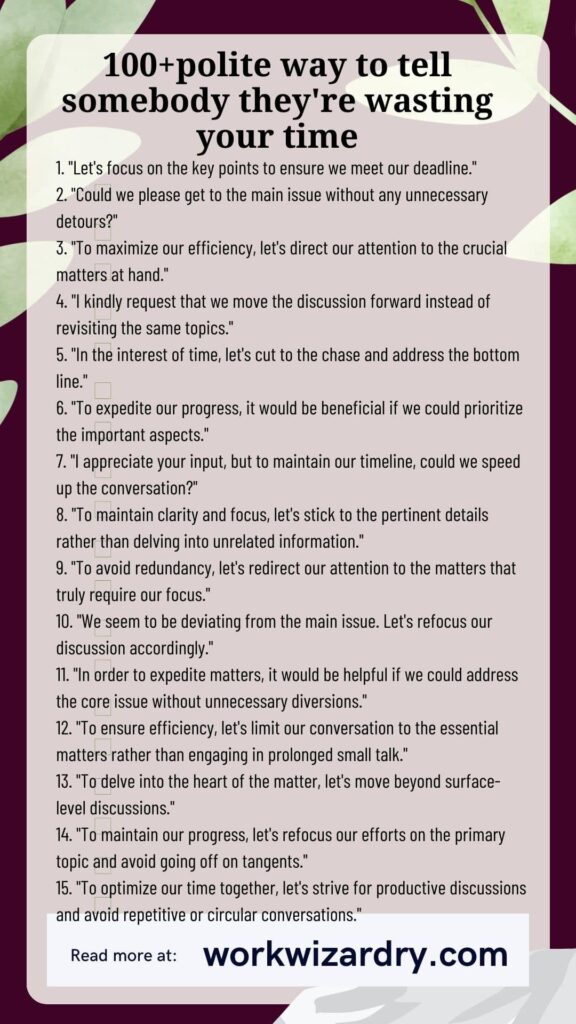
What’s a polite way to tell somebody they’re wasting your time?
To politely convey that someone is wasting your time, you can express your concerns with tact and diplomacy.
Use phrases that express the need for efficiency, refocus the conversation on the main topic, or request specific actions.
Remember to maintain a respectful and understanding tone throughout the interaction. Here are some examples on How to professionally say you are wasting my time:
1. “Let’s focus on the key points to ensure we meet our deadline.”
2. “Could we please get to the main issue without any unnecessary detours?”
3. “To maximize our efficiency, let’s direct our attention to the crucial matters at hand.”
4. “I kindly request that we move the discussion forward instead of revisiting the same topics.”
5. “In the interest of time, let’s cut to the chase and address the bottom line.”
6. “To expedite our progress, it would be beneficial if we could prioritize the important aspects.”
7. “I appreciate your input, but to maintain our timeline, could we speed up the conversation?”
8. “To maintain clarity and focus, let’s stick to the pertinent details rather than delving into unrelated information.”
9. “To avoid redundancy, let’s redirect our attention to the matters that truly require our focus.”
10. “We seem to be deviating from the main issue. Let’s refocus our discussion accordingly.”
11. “In order to expedite matters, it would be helpful if we could address the core issue without unnecessary diversions.”
12. “To ensure efficiency, let’s limit our conversation to the essential matters rather than engaging in prolonged small talk.”
13. “To delve into the heart of the matter, let’s move beyond surface-level discussions.”
14. “To maintain our progress, let’s refocus our efforts on the primary topic and avoid going off on tangents.”
15. “To optimize our time together, let’s strive for productive discussions and avoid repetitive or circular conversations.”
16. “I appreciate your perspective, but let’s stay focused on the key points.”
17. “Could we please move the discussion forward and address the main objectives?”
18. “Let’s make sure we’re utilizing our time effectively by concentrating on the most crucial aspects.”
19. “I understand your viewpoint, but we should prioritize the tasks at hand.”
20. “Could we redirect the conversation back to the primary goal?”
21. “I value your input, but let’s make sure we’re staying on track with the agenda.”
22. “It would be beneficial to streamline our discussion and focus on the essential elements.”
23. “I suggest we maintain our efficiency by sticking to the core topics.”
24. “Could we summarize the main takeaways and move forward?”
25. “Let’s ensure our time is well spent by discussing actionable steps.”
26. “I appreciate your insights, but let’s avoid getting sidetracked from the main purpose.”
27. “Can we refocus the conversation on the primary issue we need to address?”
28. “I believe we can optimize our time by concentrating on the most pressing matters.”
29. “Let’s remain mindful of our objectives and avoid unnecessary tangents.”
30. “I kindly request that we keep our discussion concise and pertinent to our goals.”
Also read: How to professionally say don’t talk to me like that and don’t be rude? (35+ Examples and tips)
How to say I don’t want to waste my time politely?
1. “I prioritize tasks of higher value, so I won’t be able to allocate time for that matter.”
2. “I value my time greatly and prefer to invest it in more meaningful endeavors.”
3. “I regretfully cannot dedicate my time to this particular matter.”
4. “I have pressing commitments that require my attention, so I won’t be able to engage in that.”
5. “I’m sorry, but I cannot commit my time to something of that nature.”
6. “I would prefer to direct my efforts towards more worthwhile pursuits.”
7. “Given my current workload, I must prioritize tasks that contribute to my goals.”
8. “Considering my existing obligations, I’m unable to spare time for activities that don’t align with my priorities.”
9. “I have a limited amount of time available, and I prefer to allocate it to endeavors with greater significance.”
10. “I regret that I cannot afford to dedicate time to matters that don’t hold substantial value.”
11. “I prioritize productivity and prefer to invest my time in endeavors that align with my goals.”
12. “I choose to invest my time in pursuits that hold purpose and contribute to meaningful outcomes.”
13. “I have important commitments that require my attention, preventing me from investing time in that particular matter.”
14. “I would rather utilize my time constructively than engage in activities that don’t contribute to my objectives.”
15. “I’m unable to allocate my time to something that doesn’t carry significant weight in terms of productivity and progress.”
Also read: How to professionally say Are you Stupid? (50+ Examples)
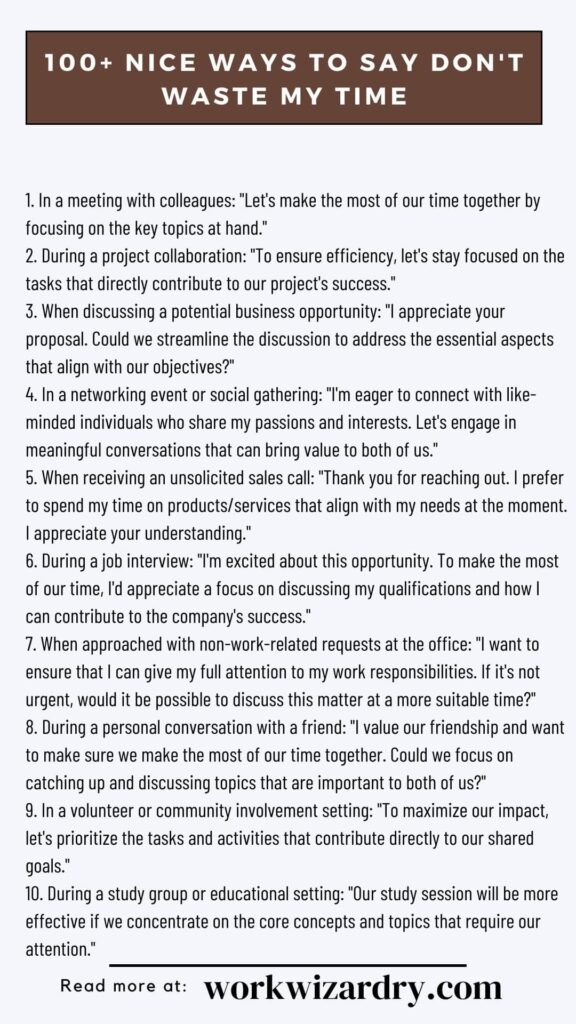
Nice way to say don’t waste my time
The following is a list of nice way to say don’t waste my time for different situations in professional settings:
1. In a meeting with colleagues: “Let’s make the most of our time together by focusing on the key topics at hand.”
2. During a project collaboration: “To ensure efficiency, let’s stay focused on the tasks that directly contribute to our project’s success.”
3. When discussing a potential business opportunity: “I appreciate your proposal. Could we streamline the discussion to address the essential aspects that align with our objectives?”
4. In a networking event or social gathering: “I’m eager to connect with like-minded individuals who share my passions and interests. Let’s engage in meaningful conversations that can bring value to both of us.”
5. When receiving an unsolicited sales call: “Thank you for reaching out. I prefer to spend my time on products/services that align with my needs at the moment. I appreciate your understanding.”
6. During a job interview: “I’m excited about this opportunity. To make the most of our time, I’d appreciate a focus on discussing my qualifications and how I can contribute to the company’s success.”
7. When approached with non-work-related requests at the office: “I want to ensure that I can give my full attention to my work responsibilities. If it’s not urgent, would it be possible to discuss this matter at a more suitable time?”
8. During a personal conversation with a friend: “I value our friendship and want to make sure we make the most of our time together. Could we focus on catching up and discussing topics that are important to both of us?”
9. In a volunteer or community involvement setting: “To maximize our impact, let’s prioritize the tasks and activities that contribute directly to our shared goals.”
10. During a study group or educational setting: “Our study session will be more effective if we concentrate on the core concepts and topics that require our attention.”
11. When reviewing project proposals or ideas: “I appreciate your input. Let’s refine our discussion to concentrate on the aspects that hold the greatest potential for success and positive outcomes.”
12. During a training session or workshop: “To ensure we absorb the most knowledge from this session, let’s stay focused on the key learnings and actively engage in the activities provided.”
13. When approached with time-consuming administrative tasks: “I’d like to optimize my productivity by focusing on tasks that require my expertise. Is there someone else who can assist with these administrative responsibilities?”
14. In a mentoring or coaching relationship: “I highly value our mentorship/coaching relationship. To make the most of our sessions, let’s prioritize discussing the areas where I can benefit most from your guidance and expertise.”
15. During a brainstorming session: “To generate the most innovative ideas, let’s stay on track by focusing on the main objective and encouraging all participants to contribute their insights.”
16. In a customer service interaction: “I appreciate your assistance. To efficiently address my concern, let’s focus on finding a solution that meets my needs in the most timely manner possible.”
17. During a group project discussion: “To ensure our project progresses smoothly, let’s stay on topic and concentrate on the tasks that require immediate attention.”
18. When receiving excessive email communication: “I strive to manage my inbox effectively. If possible, let’s consolidate our discussion into a single email to help streamline the conversation and save time for both of us.”
19. In a professional training or workshop: “To make the most of this learning opportunity, let’s actively engage in the material presented and focus on acquiring the knowledge and skills that will benefit us in our respective roles.”
20. When reviewing a lengthy document: “I want to provide comprehensive feedback. Could you please provide a concise summary highlighting the most crucial points, enabling me to efficiently allocate my time to the areas that require attention?”
Also read: 10 Ways to disagree respectfully (100+ Examples and tips)
Is it rude to say don’t waste my time?
The phrase “don’t waste my time” can come across as rude or confrontational, particularly in professional settings where maintaining a respectful tone is important.
While it is natural to feel frustrated when time is being wasted, expressing it directly in this manner may not be the most effective or diplomatic approach.
In professional interactions, it is generally more constructive to focus on positive and proactive communication.
Instead of explicitly stating “don’t waste my time,” it is advisable to employ alternative strategies that convey your expectations and boundaries without being overly confrontational.
By emphasizing efficiency, setting clear expectations, redirecting conversations, and using positive language, you can effectively communicate your desire for productive interactions while maintaining a respectful tone.
This approach helps foster a more collaborative and constructive atmosphere, where everyone can contribute effectively without feeling singled out or belittled.
Remember, effective communication is a skill that requires tact and consideration.
By choosing your words carefully and expressing your concerns in a respectful manner, you can navigate professional situations more successfully and build stronger relationships with colleagues and partners.
Informal or slang ways to say someone is wasting your time
1. “Cut to the chase, we’re on a deadline here.”
2. “Quit beating around the bush and get to the point.”
3. “Let’s get down to brass tacks and stop wasting time.”
4. “We’re going in circles. Can we move this along?”
5. “I don’t have time for this song and dance. What’s the bottom line?”
6. “Stop dragging your feet and get to the important stuff.”
7. “You’re taking forever to get to the point. Can we speed it up?”
8. “I’m getting lost in your rambling. Can you please stick to the relevant details?”
9. “We’re spinning our wheels here. Let’s focus on what really matters.”
10. “We’re going off on a tangent. Let’s refocus on the main issue.”
11. “I’m getting the runaround. Can we cut through the nonsense?”
12. “Enough with the small talk. Let’s tackle the real issue.”
13. “I’ve heard enough fluff. Let’s dive into the substance.”
14. “You’re veering off-topic. Let’s stay on track, shall we?”
15. “We’re going in circles. Can we make some progress, please?”
Also read: How to professionally say I’m too busy for this? (50+ Example responses)
Conclusion:
Overall, it is essential to maintain professionalism, respect, and clarity when expressing your preference for effective time management.
By setting expectations, redirecting conversations, emphasizing efficiency, using positive language, and actively listening, you can convey your message without resorting to a direct statement like “Don’t waste my time,” while maintaining a respectful and productive atmosphere.




